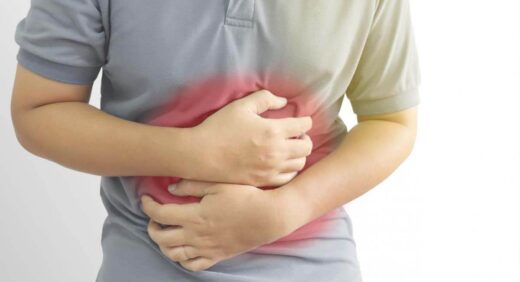Stomach pain is a common discomfort characterized by aching, tightness, or sharp sensations in the abdominal region. It can stem from various factors, including digestive disturbances, infections, inflammation, or more serious medical conditions. While mild cases may resolve on their own, persistent or severe pain warrants medical attention to rule out underlying health issues.
What Is Stomach Pain?

Stomach pain refers to discomfort or cramping in the upper abdomen, just below the ribcage. It can range from mild and temporary to intense and chronic, depending on the cause. Common triggers include indigestion, gastritis, acid reflux, and ulcers.
Common Causes of Stomach Pain
Stomach pain can arise from multiple sources, including:
- Digestive disorders (gastritis, ulcers, GERD, irritable bowel syndrome)
- Infections (bacterial, viral, or parasitic, such as Helicobacter pylori)
- Dietary factors (spicy, fatty, or acidic foods, overeating, food poisoning)
- Lifestyle habits (excessive alcohol, smoking, stress)
- Medical conditions (gallstones, pancreatitis, stomach cancer)
Persistent or worsening pain should always be evaluated by a healthcare provider to determine the root cause.
Symptoms Associated with Stomach Pain
The symptoms accompanying stomach pain vary depending on the underlying issue. Common signs include:
- Aching or sharp pain in the upper abdomen
- Nausea and vomiting
- Bloating, gas, or burping
- Loss of appetite
- Heartburn or acid reflux
Less frequent but concerning symptoms include fever, back pain, unexplained weight loss, or a metallic taste in the mouth. These may indicate more serious conditions requiring prompt medical attention.
Effective Remedies for Stomach Pain
Treatment for stomach pain depends on its cause. For mild discomfort, home remedies can provide relief, but severe or chronic pain should be assessed by a doctor.
Home Treatments for Stomach Pain Relief
- Hydration – Dehydration can worsen digestive issues. Drinking water helps maintain proper digestion and eases cramps caused by fluid loss.
- Ginger – Known for its anti-nausea and anti-inflammatory properties, ginger (in tea, supplements, or raw form) can soothe an upset stomach.
- Chamomile Tea – This herbal tea reduces inflammation and relaxes the digestive tract, making it helpful for gastritis and indigestion.
- Peppermint – Peppermint oil or tea can relieve spasms and improve digestion by stimulating bile flow.
- Apple Cider Vinegar (Diluted) – When mixed with water, it may balance stomach acidity and aid digestion, though it should be used cautiously to avoid irritation.
- Heat Therapy – A heating pad or warm compress can relax stomach muscles and ease cramps.
- BRAT Diet – Bananas, rice, applesauce, and toast are gentle on the stomach and help firm stools during digestive upset.
- Light Exercise – Walking or gentle movement aids digestion and reduces bloating.
- Deep Breathing Exercises – Helps relax the digestive system and alleviate stress-related stomach pain.
Who Is Most Affected by Stomach Pain?
While anyone can experience stomach pain, certain groups are more prone, including:
- Older adults
- Individuals with a family history of digestive disorders
- People with high stress levels or poor dietary habits
- Those who consume excessive alcohol or smoke
- Patients on medications that irritate the stomach
Serious Conditions Linked to Stomach Pain
Though often benign, stomach pain can sometimes indicate severe health problems, such as:
- Gastric ulcers or cancer
- Gallbladder disease or pancreatitis
- Heart conditions (referred pain)
- Infections or autoimmune disorders
When to Seek Medical Help
Immediate medical evaluation is necessary if stomach pain is:
- Severe and lasts more than 24 hours
- Accompanied by fever, vomiting, or unexplained weight loss
- Radiating to the back, chest, or shoulders
- Occurring in high-risk individuals (elderly, pregnant women, or immunocompromised patients)
Preventing Stomach Pain
Adopting healthy habits can reduce the risk of stomach discomfort:
✔ Eat a balanced diet – Avoid excessive spicy, fatty, or acidic foods.
✔ Stay hydrated – Drink plenty of water throughout the day.
✔ Manage stress – Practice relaxation techniques like meditation or yoga.
✔ Exercise regularly – Promotes healthy digestion and reduces bloating.
✔ Avoid smoking and excessive alcohol – Both irritate the stomach lining.
✔ Eat slowly and mindfully – Prevents overeating and indigestion.
Frequently Asked Questions About Stomach Pain
What helps severe stomach pain at home?
For temporary relief, try herbal teas (peppermint, chamomile), a heating pad, or the BRAT diet. However, persistent pain requires medical attention.
Where is stomach pain usually felt?
Most stomach pain occurs in the upper left abdomen, but it can radiate to other areas, such as the back or chest.
How do I know if I have a stomach infection?
Symptoms like nausea, vomiting, diarrhea, and fever may indicate an infection. A doctor can confirm the diagnosis.
Can stomach flu cause pain?
Yes, viral gastroenteritis (“stomach flu”) often leads to cramping, nausea, and diarrhea.
How long do stomach spasms last?
Spasms may last minutes to hours. Prolonged spasms should be checked by a doctor.
Which foods help relieve stomach pain?
Bland foods like rice, boiled chicken, oatmeal, bananas, and yogurt are gentle on the stomach.
Can stomach pain radiate to the back?
Yes, especially with conditions like ulcers, pancreatitis, or gallbladder disease.
How can I manage stress-related stomach pain?
Deep breathing, regular exercise, and avoiding trigger foods can help. Chronic stress-related pain should be evaluated by a professional.